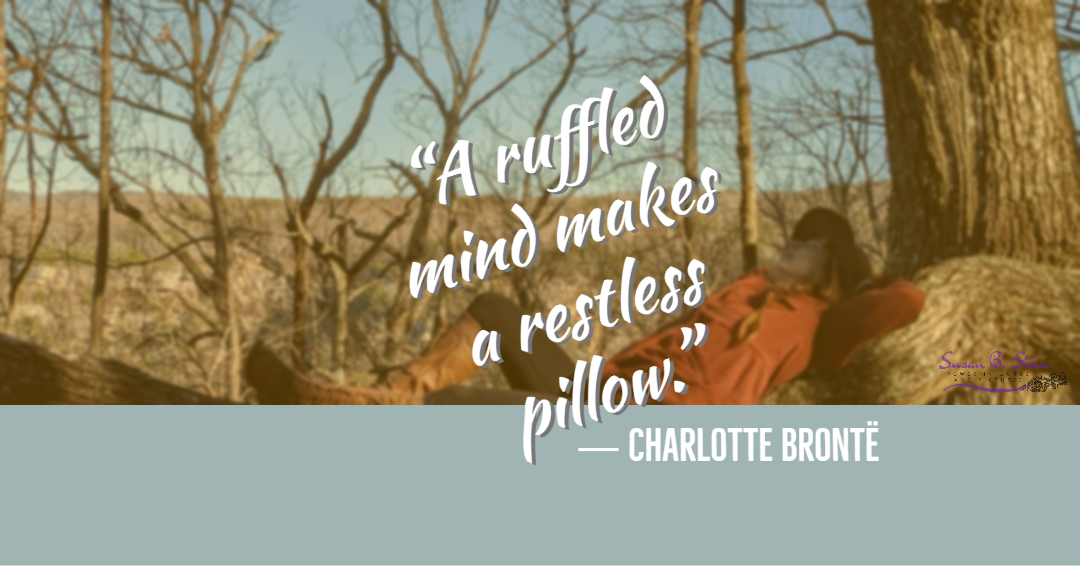Pillow Talk

Pillow Talk
“A ruffled mind makes a restless pillow.” ― Charlotte Brontë
♦♦♦
50-70 million people (in the United States) share a common problem.
Companies in America lose more than $60 billion each year because of employees with the problem.
Several hundred thousand driving accidents occur each year because drivers have the problem.
“Do you ever sleep?” my husband asked. “Of course, I do. You just are asleep when I’m asleep,” I replied. The truth, though, was more along the lines of “I sleep whenever I’m able to be asleep, whenever that might be.” I have never thought of myself as someone with a sleep problem — I don’t have sleep apnea, and i can fall asleep after a cup of coffee. I used to say I just liked being up in the middle of the night because I could get more done while everyone was sleeping. While that is still true, getting things done is a great benefit of a bigger problem. Charlotte Brontë doesn’t know me at all — she died a little over 100 years before I was born — but she was all to familiar with the power a ruffled mind could have on a person’s pillow.
Stress causes anxiety, anxiety causes sleep problems, and sleep problems cause more health issues than you might ever have considered. At a time when the unemployment is higher than ever and the unknown ramifications of a virus occupy our lives, it’s no wonder stress is high, and that means more people than ever might be struggling to get a good night’s sleep. Maybe even you. We might be tempted to reach for a bottle of pills or alcohol to help you drift off, but I think a better solution is one that will help us down the road. Luckily, there are many solutions from which to choose. But first, you might wonder why it’s important. Didn’t someone say I’ll sleep when I’m dead? They did, and they might have had a longer and more pleasant life if they had made time for sleeping when they were alive. I do not want to wait until I’m dead, nor do I want to bring that about sooner than necessary.
According to WebMD, a sharper brain, a boost in your mood, a healthier heart, better blood sugar, better athletic performance, and weight control are some of the reasons to get serious about getting your sleep. The one benefit, though, that matters most to me is that better sleep means a stronger immune system. It should matter to everyone.
Sleep deprivation triggers inflammation in the body. While inflammation is a good thing in the right situation, when it is chronic (ongoing), it is not good at all, and our immune system pays the price. The worst part is that sleep deprivation triggers inflammation and the problems it brings cause more sleep deprivation. What a vicious circle! It will take some extra effort to get a handle on what brings better sleep.
If you are at home a bit these days, you are in a great position to make some serious headway in the sleep department. It sounds so simple when someone says we ‘just’ need to do better handling stress. It’s anything but easy. Babies and toddlers need up to 17 hours of sleep a day, teenagers up to 12, and by the time you’re an adult, 7-9 hours of sleep a night is a good goal. Too little sleep and too much sleep will both trigger problems in your body, so let’s try to come up with the best plan for YOU (and for me).
Good sleep starts long before you go to bed.
- Begin with bright light in the morning. Whether you spend time with bright sun shining in the window, go for a walk in the early light or use a lamp that is intended to mimic the sunlight, this will reset your circadian rhythms, and that’s a key to a better sleep system.
- Exercise. At some point during the day, do some exercise. A brisk walk is always nice and tends to recharge your batteries, and by the time you go to bed, your body won’t feel it has so much energy pent up. This also helps with some of the anxiety you might be feeling.
- Eat early. You might find that you need a little snack at night, but eat your nighttime meal 3-4 hours before going to bed.
- Avoid alcohol and caffeine in the evening. Caffeine stays in your system for several hours, so can be a problem with sound sleep. Alcohol, while you might think will help you drift off, actually alters the melatonin in your body, which is very important for getting a good night’s sleep.
- Have a routine for the end of the day. Read a book(the kind with pages), listen to some relaxing music, take a warm shower or bath. Come up with some kind of routine that tells your body it’s time to wind down. Stay away from screens at least an hour before you go to bed.
- Keep it cool and dark at night. I’m almost always cold, but I have to agree that keeping the bedroom cooler at night has helped. Because even a little light can be disruptive, I picked up a sleep mask, and I like that it’s really dark, and I just have to lift the covers from my eyes to see the light in the bathroom.
- Breathe. If thoughts come into your head that just won’t stop (which tends to happen at night), try to breathe through it. Breath in for 4, hold for 7, exhale for 8, repeat at least 3 times. It has worked many times for me.
Some people go to bed early, some go to bed late. There are 24 hours in the day, so you can find the time that works for you. When the stress is a lot during the day, it can disrupt your sleep. When you have disrupted sleep, it is more difficult to handle the stress of the day. Do yourself a favor and find a little peace at the end of your day under the covers. Sweet dreams!



